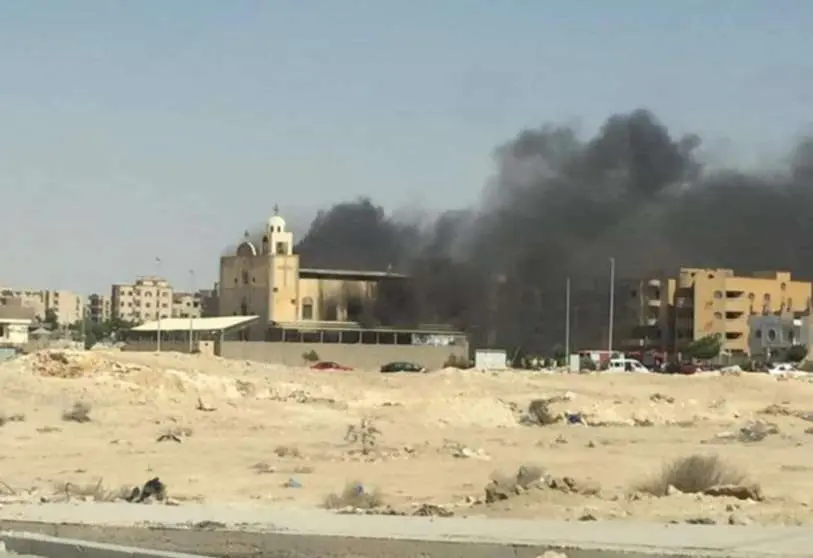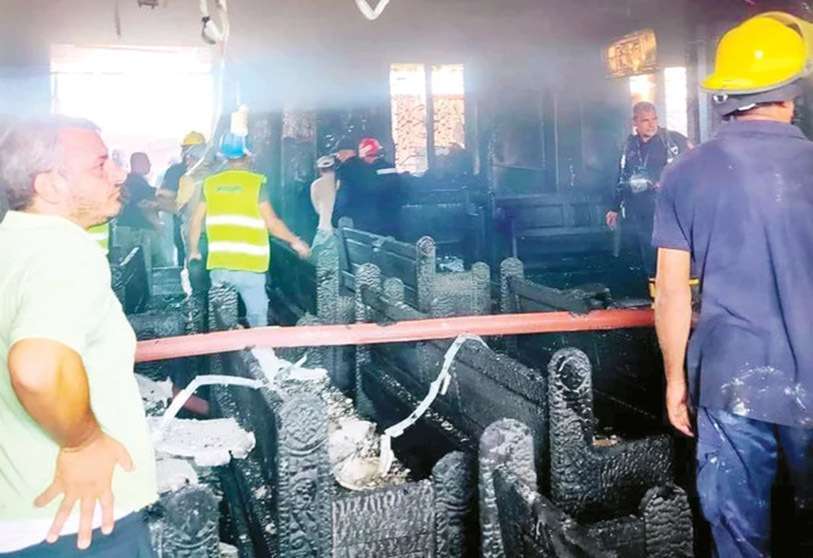A new fire in a Coptic church strikes Egypt's Christian minority

Another setback for Egypt's Coptic community. Just two days after the deadly fire in the Orthodox church of Abu Sefein, which claimed 41 lives, a similar incident has occurred in the Coptic church of Anba Bishoy, located in the governorate of Minya, just under 270 kilometres from Cairo and also on the banks of the Nile. A short circuit caused a fire on the ground floor of the church that eventually engulfed the interior of the compound, which opened in June 2019, according to the Interior Ministry's version.
No fatalities were reported on this occasion. Only one parishioner received medical attention for smoke inhalation, but he did not even have to be hospitalised or taken away. This was confirmed by the governor of Minya, Osama al-Qadi, and Archbishop Moussa Ibrahim, spokesman for the Coptic Orthodox Church. The religious institution issued an information note informing the faithful that the interior of the church had been engulfed in flames, and that it had been practically destroyed.
At around 2.30 p.m. local time on Tuesday, the authorities were notified of a fire at the Anba Bishoy temple. According to church officials and witnesses, the fire was caused by an electrical fault in an empty, locked room, presumably unusable. Six minutes later, four ambulances arrived at the scene and another four fire engines were deployed to start the operation to bring the flames under control. Police and civil protection personnel, also present, cordoned off the area and assisted those present.
A massive fire destroyed a church in Egypt's ?? province of Minya on Tuesday, only days after a fire at a nearby Coptic church killed 41
— Saad Abedine (@SaadAbedine) August 17, 2022
The fire at the Anba Bishoy Church, 273 kilometres south of Cairo, involved no casualties but badly damaged much of the building's structure. https://t.co/rEGUvOlQJe pic.twitter.com/SwTuiLccZT
The incident took place in an area marked by the persecution of the Coptic minority in the North African nation. Conservative Islamic Salafist movements are particularly active in the rural areas of Upper Egypt, a region in which Minya is located. In this governorate, a high number of attacks have been recorded in the last year against the Orthodox Christian population, who are persecuted throughout the country for their faith.
The public prosecutor's office announced in a statement that it had launched a judicial investigation to establish the facts, following the same procedure as for the Abu Sefein fire. The Public Prosecutor's Office sent a team to the Anba Bishoy church to interrogate witnesses and analyse the remains of the fire. A team of experts has also been sent to the area to examine the structure of the building and assess the damage.
Egypt was still in mourning on Tuesday. The death in Cairo of 41 people, including at least 15 children, shocked the country and the international community. The flames struck the Abu Sefein orthodox temple, built in the humble Imbābah neighbourhood of the Giza Governorate. The fire broke out on the first floor due to the breakdown of a power generator used by the church to alleviate recurrent power outages. Rescue efforts were insufficient. Witnesses quoted by the Associated Press described scenes of stampeding, jumping out of windows and death.
Liverpool footballer Mohamed Salah donated more than three million Egyptian pounds, the equivalent of about 153,930 euros, to the authorities to rebuild the Giza temple. It is not the first time that the Egyptian star, a Champions League winner with England, has donated to social causes in his country, but this is the first time he has donated to the Coptic community. Salah is a Muslim.

In principle, the causes of both events are the same: a fault in the electrical installation. However, members of the orthodox Christian minority suspect that it may have been sabotage or an attack, which is why they have questioned the official version. If true, the events highlight the inadequacies of the infrastructure used by the community, which is beset by bureaucratic hurdles and weak institutional support. If it is false, it is yet another example of the persecution they suffer in Egypt.
The North African country is home to the largest Christian community in the Middle East. Egypt is home to more than 16 million Copts, who make up around 6% of the population. But life is not easy for them. According to data from the NGO Open Doors, Egypt is the 20th most hostile country in which to be a Christian. Persecution of Copts is a common practice, perpetrated by Muslim extremist groups.
Egyptian President Abdel Fattah al-Sisi has on numerous occasions defended the rights of Copts, and has made several symbolic gestures to the community that have been welcomed, such as his Christmas visit to the Coptic Orthodox Cathedral of St Mark, the most important church for the Orthodox minority in Egypt. Al-Sisi also ordered the construction of a Nativity of Christ Cathedral in Egypt's new administrative capital, which is expected to replace Cairo in the near future.








